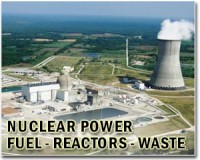 |
Paris (UPI) Apr 20, 2011 Opposition to nuclear power is growing in France, the world's second-largest nuclear energy market behind the United States. Environmental activists have staged demonstrations and launched hunger strikes to call for the closure of the Unit 1 reactor at the Fessenheim nuclear power plant, one of France's oldest. Built in 1977, the reactor is in eastern France about 1 mile from the German border, in an area that experiences frequent earthquakes. Amid the unfolding nuclear crisis at the Fukushima Dai-Ichi plant in Japan, two Swiss cantons nearby called on the French government to close Fessenheim until its safety is guaranteed. The reactor, just as the other 57 in the country, is run by Electricite de France. The company's Chief Executive Officer Henri Proglio told French newspaper Le Figaro this week that Fessenheim and the other reactors are in an "excellent condition." Fessenheim, he added, has been regularly modernized since it came online in 1978. In the aftermath of the Japanese nuclear crisis, French President Nicolas Sarkozy ordered stress tests for all French reactors. He didn't call for abandoning nuclear power, and such a move would be hard to realize: The 58 French reactors produce around 80 percent of the domestic power demand and make France an electricity exporter. In neighboring Germany, home to 17 reactors that produce around one-fifth of the country's electricity demand, politicians took more drastic steps. German Chancellor Angela Merkel ordered comprehensive stress tests for all 17 German reactors and decided to shut down the seven oldest, most of them built during the 1970s, for at least three months. If their safety can't be guaranteed, they might be taken off the grid for good. Merkel, who in the fall of 2010 decided to prolong the use of nuclear power in Germany, said last week her government would look for ways to drop the energy source "as soon as possible." Sarkozy has vowed that he would close down any reactors that fail the stress tests. However, he hasn't questioned recommendations made by the country's nuclear watchdog ASN to extend the running times of several older plants by another decade. ASN has since said it would re-evaluate those recommendations after the stress tests. Eleven reactors will reach 40 years of operation within the next decade.
Share This Article With Planet Earth
Related Links Nuclear Power News - Nuclear Science, Nuclear Technology Powering The World in the 21st Century at Energy-Daily.com
 Japan to take effective control of TEPCO: report
Japan to take effective control of TEPCO: reportTokyo (AFP) April 20, 2011 Japan plans to put Tokyo Electric Power Co (TEPCO), operator of a stricken nuclear plant, under effective state control so it can meet its compensation payments, a report said Wednesday. Tokyo will set aside several trillion yen in public funds that TEPCO can dip into if it runs short for payouts to people affected by radiation leaking from its Fukushima Daiichi plant, the Yomiuri Shimbun sa ... read more |
|
| The content herein, unless otherwise known to be public domain, are Copyright 1995-2010 - SpaceDaily. AFP and UPI Wire Stories are copyright Agence France-Presse and United Press International. ESA Portal Reports are copyright European Space Agency. All NASA sourced material is public domain. Additional copyrights may apply in whole or part to other bona fide parties. Advertising does not imply endorsement,agreement or approval of any opinions, statements or information provided by SpaceDaily on any Web page published or hosted by SpaceDaily. Privacy Statement |